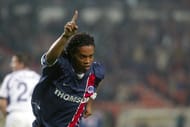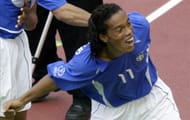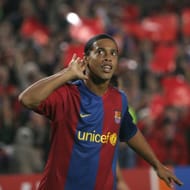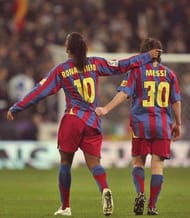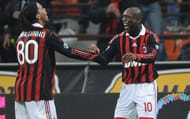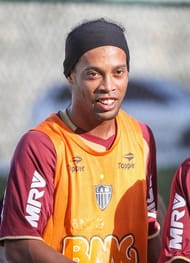Ronaldinho was not just a player. He was something more. He redefined the game with his vision, touch and invention. Perhaps the most gifted player of his generation, he was the kind of player who drew the fans to the stadiums. In the past 10 years, we have witnessed a lot of great players. From Zola to Beckham, to Maldini to Zidane, and the list goes on and on. But there is hardly anyone who played the game as beautifully as him. He was destined to be a footballer, right from his birth. His elder brother Roberto, who played for Gremio, was his Godfather. But Roberto’s career was cut short because of injury issues. Ronaldinho followed his brother’s footsteps, and started playing Futsal at Gremio from the age of 7. He was impressive right from the start of his playing days, and people around Southern Brazil knew that there was something special about this kid, and knew that he would go on to become a great player.
Rivalino and Maradona were his other inspirations, and both were left-footed. Even his elder brother was left-footed, thus he also wanted to become a left-footed player like his heroes. His former Gremio teammate, Tinga revealed that he was no stranger to hard work and said that his life has always been about football. After winning the U-17 World Cup with Brazil in 1997, he returned to Gremio for first team action. He was an instant hit among fans, and adapted to the conditions well. And he was the kind of player, who produced his best performances in big matches. He constantly excelled against Gremio’s bitter rivals, Internacional, so much so, that the whole nation took notice. He grabbed everyone’s attention in one such match against Internacional in a regional final, where he easily dribbled past Dunga, the 94 World Cup winning captain.
It wasn’t long before he was called for the Brazilian national squad. It was another milestone in his career, and he thoroughly deserved it. He took to the International stage quite easily, though, and looked every inch a Brazilian player, when he scored against Venezuela in the Copa America, by dribbling past 2-3 defenders in the penalty box, and then scoring from a really tight angle. Suddenly, the Kid from Porto Alegre had become a star, and when Paris Saint Germain expressed an interest in him, he couldn’t let go of that opportunity. It was time for him to leave his boyhood club, and set foot in European football. Arsenal were interested in him, but the deal fell through, as he could not attain a work permit as he was a non-EU player who had not played enough International matches. When it was revealed that Ronaldinho was on his way out to Paris Saint Germain, the fans were very angry, and labelled him as a ‘Traitor’.
After bidding farewell to Gremio, it was time for him to showcase his brilliance on European soil. It was obviously a big change for him, from a small city in Southern Brazil to Paris, the French capital and the largest city in France. But surprisingly, he settled in the French capital rather easily. He showed flashes of genius which promised much for the future, though there was more work to be done. He was a highly gifted player, and it showed. The then Paris Saint Germain coach, Luis Fernandez was quoted saying that Ronaldinho really tried hard for the first year, and the coaching staff, the fans as well as the board were helping him to become better.
Even here, he performed extra ordinarily well in the big matches, but just couldn’t focus much, in the relatively smaller games. In the first season he had 48 appearances, where he scored 13 goals and assisted in 10. Now, it was time for him to prove himself in the greatest stage of all, the FIFA World Cup, in 2002. The 4 time World Champions were not the favourites, and the country had little hope in the team, as they had been pretty average in the qualification rounds. But Kleberson, a member of the Brazil team, said that the team always believed in themselves, and were confident.
Brazil, without the pressure of being the tournament favourites, were able to express themselves freely. Ronaldinho played alongside Ronaldo and Rivaldo in the attacking third. The youngster blossomed in such celebrated company. Playing alongside the likes of Ronaldo, Rivaldo, Cafu, Emerson and others helped him share responsibilities, and thus, he could play with more freedom. He played well throughout the tournament, but it was in the quarter-finals against England, where he truly left his mark.
Michael Owen opened the scoring for England, before a brilliant run from Ronaldinho led to a Rivaldo equaliser, at the stroke of half time. And five minutes into the second half, something ‘Special’ happened. A stroke of genius from the 22 year old. An amusing free kick from 35m out, beat David Seaman, and went inside the goal at the top left corner, enabling Brazil to take a 2-1 lead against England. But 7 minutes later, he was sent off after receiving a red card. It was a foolish one to get, but his goal was enough to take Brazil into the semis.
Brazil eased past Turkey in the semi-finals, and set a date with Germany in the Finals. 2 immaculate strikes from Ronaldo, without a reply from the Germans, saw Brazil win their record fifth World Cup. It was a dream come true for Ronaldinho and this encouraged him to do greater things in life.
But, back in France, things weren’t going too well with Paris Saint Germain. His inconsistency was still a huge worry. PSG manager, Luis Fernandez complained that Ronaldinho was more interested in the Brazilian night-life than turning out for Paris Saint Germain. It even led him to say that, “After the World Cup win, it was the same Ronaldinho but a different player. Which was a shame, as we gave him a lot.”
It was time for him to move on. Top European clubs cued up for his signature, but he decided that his future lay in Spain, and joined Catalan giants Barcelona, in 2003. His impact in Barcelona was immediate. His tricks and skills were no longer just for show, he was becoming a decisive player, scoring crucial goals at crucial moments. He was one of the players, who single handedly made a difference to the team. Under Dutch legend Frank Rijkaard, Barcelona became unstoppable. And it was Ronaldinho who was the main element in Rijkaard’s attacking philosophy at Barcelona.
In Ronaldinho’s 2nd year at the club, he helped Barcelona to their 1st League title in 6 years. He had pace, was technically very skilful, could control the ball brilliantly, and had a great vision for the game. He did things with the ball, which were just wonderful to watch. His most defining performance, which encapsulated the genius in him, came against their bitter rivals, Real Madrid, in November 2005, at the Bernabeu, where he scored twice as Barcelona defeated Real Madrid 3-0. After Ronaldinho’s brace, he got a standing ovation from the home fans. He again led Barcelona to another La Liga title, back-to-back.
But there was one trophy that both Ronaldinho, as well as Barcelona craved, and that was the UEFA Champions League. But 2005-06 season was the to change all that. The Brazilian World Player of the Year inspired Barcelona to play some of the best football Europe had ever seen. Barcelona met Arsenal in the Champions League final, and although they went a goal down early, the Catalan giants came from behind to win it 2-1. And Ronaldinho was their hero.
He was treated like a king in Barcelona for two years, and it was everything a player could wish for. But he couldn’t replicate his club form for his country. The 2006 World Cup was supposed to be Ronaldinho’s chance to shine. He was the undisputed king of Barcelona, but with Brazil, he had to settle for a supporting role in a line-up of stars. Ronaldinho wasn’t born to be the main player of a team, he was born to be an extraordinary team-mate. When people wanted to make him the Star man, he couldn’t cope. Brazil won their first 4 matches, but their performances were unconvincing. And Ronaldinho looked a shadow of the player who had been terrorizing European defences all season long. In the 2006 World Cup, he would’ve been the star player, but he looked afraid of playing alongside Ronaldo and Kaka. He wanted to be one of the others. A 1-0 loss against France in the quarter-finals ended Brazil’s World Cup hopes. Brazil’s performances were criticized heavily back home. Ronaldinho said, “That’s football. When you win, you get compliments. When you lose, you get criticized.”
Back in Barcelona, Ronaldinho started looking far less invincible, and more human. His levels of desire and motivation were called into question. Compared to his earlier years at Barcelona, his performance in the latter seasons were falling. But yet, he was still a hugely marketable figure. Perhaps he started embracing that culture a little too much. He was giving too much attention to adverts. And that lifestyle was certainly not favouring his football.
With a new generation coming through at Barcelona, Ronaldinho found himself increasingly isolated, and sometimes even on the sidelines. It became evident that he needed a fresh start to revive his career. In July 2008, he rejected a £25.5 million offer from Manchester City to join Milan on a three-year contract thought to be worth around £5.1 million (EUR6.5 million) a year, for €22.05M plus €1.05M bonus each season (€24.15M in 2010).
By leaving Barcelona, he left behind a legacy. Something which he or the fans will never forget. He took the Catalan giants to where they are today. Without him, it would’ve been really hard for Rijkaard to carry out his work in his desired way. He also won a host of individual awards.
Here’s a look at Ronaldinho’s individual honours while at Barcelona :-
- Don Balón Award (2): 2003–04, 2005–06
- La Liga Ibero-American Player of the Year (1): 2004
- FIFA World Player of the Year (2): 2004, 2005
- Ballon d’Or (1): 2005
- FIFPro World Player of the Year (2): 2005, 2006
- UEFA Club Best Forward (1): 2004–05
- UEFA Club Footballer of the Year (1): 2005–06
- UEFA Team of the Year (3): 2003–04, 2004–05, 2005–06
- FIFPro World XI (3): 2004–05, 2005–06, 2006–07
In AC Milan, Ronaldinho had a promising start to the season, but he struggled with fitness, and that affected his playing time. In his second season as an AC Milan player, he looked really good at times, but wasn’t consistent enough. He was Milan’s best player that season, with 17 goals and 17 assists. He was now looking more and more like the player he was before. Despite having returned to good form and being named as a member of the 30-man provisional squad, he was not named in Dunga’s final squad of 23 for Brazil in South Africa for the 2010 World Cup. This came as a surprise for many, and Ronaldinho himself. During his 3rd season at the club, he decided to move back to Brazil. He was linked with a move back to Gremio, but he signed a 3 year deal with Flamengo, on 11th January, 2011.
On 4th June, 2012, after a financial rift with Flamengo, Ronaldinho joined Atletico Mineiro on a 6 months contract.
Ronaldinho de Asssis Moreira – Once the most feared man in Europe, the player who exploited European defences, with a smile, one of the best players the world has ever seen, one of Brazil’s greatest, one of the most gifted players of this generation.
But the question is – can he become the world’s best again? Can he enthral Europe again? Can he become Brazil’s missing element and lead them in the 2014 World Cup? Can he?
It sounds a little too much, but after all he was born to play football. And as we know, anything can happen in this beautiful game. He has 2 years to find his form, return to the national team and lead Brazil in the 2014 World Cup. This will be a huge test for him, but he has had difficulties right from the start of his career. If he has the right mindset and motivation to do it, then he will surely succeed. And we as fans, can only pray he does.
